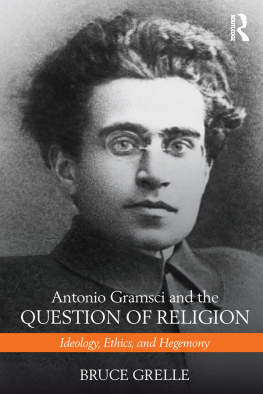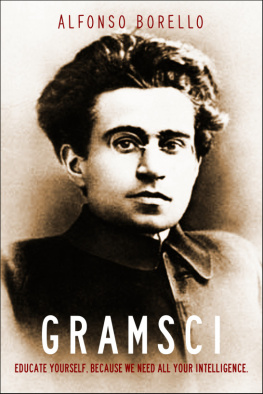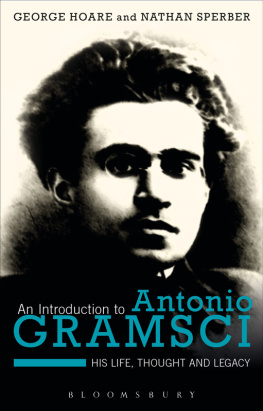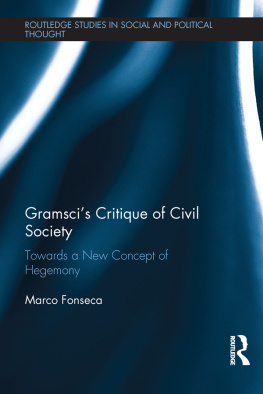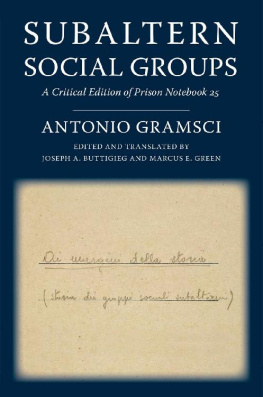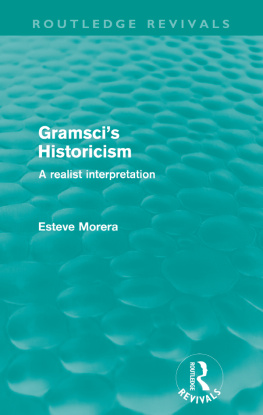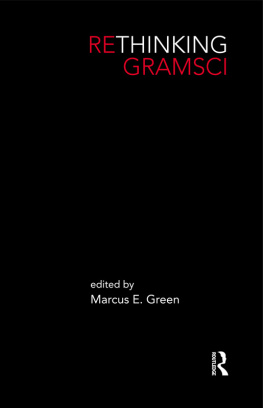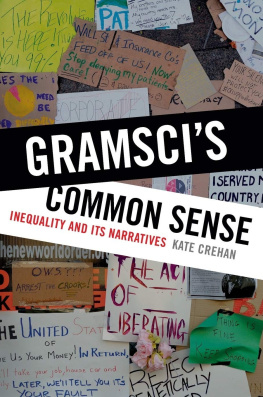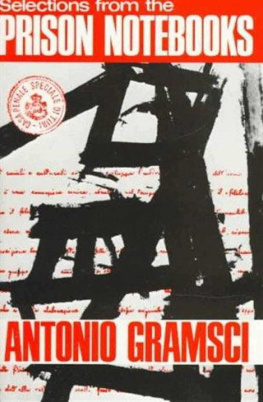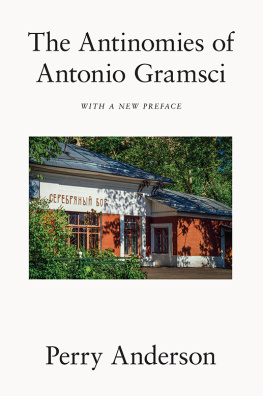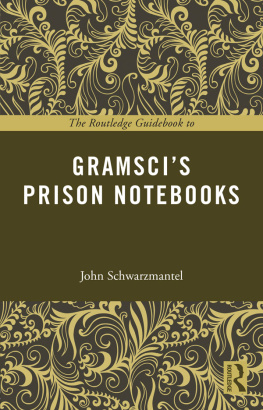
Antonio Gramsci and the Question of Religion
Antonio Gramsci and the Question of Religion provides a new introduction to the thought of Gramsci through the prisms of religious studies and comparative ethics. Bruce Grelle demonstrates that many of Gramscis key ideason hegemony, ideology, moral reformation, traditional and organic intellectualswere formulated with simultaneous considerations of religion and politics. Identifying Gramscis particular brand of Marxism, Grelle offers an overview of Gramscis approach to religion and applies it to contemporary debates over the role of religion and morality in social order and social change. This book is ideal for students and scholars interested in Gramsci, religion, and comparative ethics.
Bruce Grelle is Professor and Director of the Religion and Public Education Project in the Department of Comparative Religion and Humanities at California State University, Chico, USA.
Bruce Grelles excellent new study of Gramscis thought shows just how much Gramscis revisionist Marxist ideas (of hegemony, culture, and religion itself, among others) can contribute to contemporary studies of religious ethics. Thinking with and beyond Gramsci, Grelle articulates powerful theoretical tools to analyze the multifaceted political and social influence of religious practices and discourses.
Aaron Stalnaker, Indiana University, USA
This is a highly original and creative study of an often-ignored figure whose thought has much to offer to contemporary work in the study of religious ethics. Grelles book is grounded in solid scholarship; it is persuasive in its interpretations of Gramsci; it is creative and courageous in its own constructive argumentation; and, most importantly, it is written in highly accessible and lucid prose.
Sumner B. Twiss, Florida State University and Brown University, USA
Antonio Gramsci and the Question of Religion
Ideology, Ethics, and Hegemony
Bruce Grelle

First published 2017
by Routledge
2 Park Square, Milton Park, Abingdon, Oxon OX14 4RN
and by Routledge
by 711 Third Avenue, New York, NY 10017
Routledge is an imprint of the Taylor & Francis Group, an informa business
2017 Bruce Grelle
The right of Bruce Grelle to be identified as author of this work has been asserted by him in accordance with sections 77 and 78 of the Copyright, Designs and Patents Act 1988.
All rights reserved. No part of this book may be reprinted or reproduced or utilized in any form or by any electronic, mechanical, or other means, now known or hereafter invented, including photocopying and recording, or in any information storage or retrieval system, without permission in writing from the publishers.
Trademark notice: Product or corporate names may be trademarks or registered trademarks, and are used only for identification and explanation without intent to infringe.
British Library Cataloguing-in-Publication Data
A catalogue record for this book is available from the British Library
Library of Congress Cataloging in Publication Data
Names: Grelle, Bruce, author.
Title: Antonio Gramsci and the question of religion : ideology, ethics,
and hegemony / Bruce Grelle.
Description: New York : Routledge, 2016. | Includes bibliographical
references and index.
Identifiers: LCCN 2016013411 | ISBN 9781138190641 (alk. paper)
Subjects: LCSH: Religious ethics. | Religion. | Ethics. | Gramsci,
Antonio, 1891-1937--Influence.
Classification: LCC BJ1188 .G74 2016 | DDC 195--dc23
LC record available at https://lccn.loc.gov/2016013411
ISBN: 978-1-138-19064-1 (hbk)
ISBN: 978-1-138-19065-8 (pbk)
ISBN: 978-1-315-64088-4 (ebk)
Typeset in Bembo
by Saxon Graphics Ltd, Derby
For Debbie and Emily
Contents
This book has been a long time in the making, and I have had the support of many people during that time. I take this opportunity to thank my colleagues in the Department of Comparative Religion and Humanities at California State University, Chico. I am also grateful to the College of Humanities and Fine Arts at CSU, Chico for a research grant and a sabbatical that facilitated work on this project. I thank my parents, brothers, and in-laws for their ongoing encouragement and support. Most of all, I wish to thank my wife, Debbie, and my daughter, Emily, for their love and care. Their presence always reminds me of what is most valuable in a mans life.
Quotations from Selections from the Prison Notebooks of Antonio Gramsci (New York: International Publishers, 1971) are printed by permission. An earlier version of chapter six appeared in Soundings: An Interdisciplinary Journal (78: 3/4, 1995) and is used here by permission.
Antonio Gramsci and the Question of Religion: Ideology, Ethics, and Hegemony
A 2009 book titled Perspectives on Gramsci assembled a dozen scholars from the humanities and social sciences to demonstrate the contemporary importance of Gramsci to their respective fields of inquiry. According to its editor, the book will be of interest to students and scholars of political philosophy, economics, film and media studies, sociology, education, literature, post-colonial studies, anthropology, subaltern studies, cultural studies, linguistics and international relations (Francese 2009: i). Notably absent from this list are religious studies and comparative ethics. Indeed, these are typically not included among those fields of inquiry that have been substantially influenced by an encounter with Gramscis thought. This is despite the fact that many of his key ideasideology, hegemony, common sense, traditional and organic intellectuals, passive revolution, intellectual and moral reformationwere developed in the context of his reflections on the history of religions, especially Christianity, and in the context of his interpretation of Marxism according to a religious paradigm. In the present work I explore how the study of religion and ethics can benefit from a more thorough engagement with Gramscis thought.
A main goal of the critical study of religion and ethics is to understand the roles that religiousmoral discourses play in struggles for power between competing social groups. How are religion and morality used for political purposes? What roles do religious ideas, myths, ethics, rituals, and institutions play in the creation, maintenance, and transformation of societies? What part do religion and morality play in the exercise of domination by some groups over others and also in struggles for liberation from such domination? Gramscis writings address these questions about the politics of religion and morality in an especially insightful and suggestive manner.
It may at first seem odd to suggest that the work of Antonio Gramsci (18911937), a militant Marxist intellectual and one of the founders of the Italian Communist Party, might prove to be a rich resource for the study of religion. After all, Marxism is notorious for describing religion as the opium of the peopleas nothing more than a form of ideology that reflects underlying socialeconomic factors and justifies the interests of the dominant classes in history and society. On this view, religion is seen as an illusion and as a form of false consciousness. Morality is regarded simply as a cloak for class interests and as a form of social control. However, in this book, I argue that Gramscis reformulation of the Marxist concepts of ideology and hegemony enable us to keep questions about the politics of religion and morality in sharp focus while moving beyond the determinism and reductionism of orthodox Marxist accounts.
Next page
